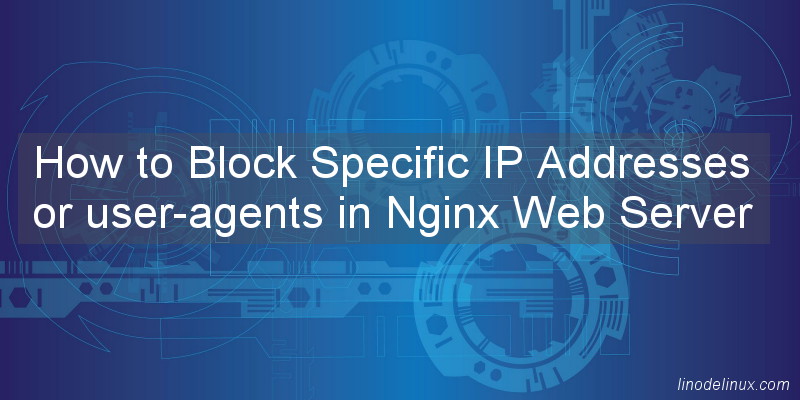Blocking specific IP addresses or user agents in your nginx web server can offer multiple security and performance benefits for your website.It may also include blocking malicious traffic from reaching your website, minimizing server load, and protecting against potential DDoS attacks. In this post, we will discuss how to configure nginx to block specific IP addresses or user agents, as well as the various rationale for doing so.

Here is a configuration example for blocking specific IP addresses or user agents with nginx access control:
http {
...
# Block specific IP address
deny 192.168.1.100;
allow all;
# Block specific user-agent
if ($http_user_agent ~* (badbot|spambot)) {
return 403;
}
...
}
Explanation :
This configuration prevents the IP address 192.168.1.100 from accessing the server and returns a 403 Forbidden error to any user-agent containing the string “badbot” or “spambot.” As applicable, IP addresses and user agents can be added or removed.
Important Note : This configuration is only effective for blocking traffic before it reaches the server and should not be used in replacement of other security measures such as firewalls and intrusion detection systems.
Why it is needed to block specific IP addresses or user agents?
In nginx settings, restricting specific IP addresses or user agents can be helpful in a variety of scenarios.
Here are few examples:
1. Security: By blocking particular IP addresses or user agents, you can protect your server from harmful attacks. For example, you may wish to restrict IP addresses associated with known spam or hacking attempts.
2. Traffic management: Blocking specific IP addresses or user agents can also assist in managing server traffic. You may choose to limit traffic from certain countries or regions, for example, if your server experiences heavy traffic from these places.
3. Compliance: Certain companies or organisations may be required by regulations to block certain categories of traffic. For this reason, companies or organisations may be require to block traffic from specific nations.
4. Brand protection: By blocking particular IP addresses or user agents, you may safeguard your brand and prevent others from stealing your content or data.
5. Prevent DDoS attacks: By blocking specific IP addresses or user agents, you can prevent DDoS attacks, which can cause your server to go offline.
Using nginx access control to ban specific IP addresses or user-agents for the aforementioned reasons are just a few examples of why you may want to do so. Generally, it is a great tool for managing traffic and protecting your server and resources.
Conclusion:
Blocking specific IP addresses or user agents in nginx is a useful way to improve the security and performance of a website. By blocking malicious traffic from reaching your site, reducing your server’s load, and protecting against potential DDoS attacks, you can maintain the security and stability of your website. With the proper configuration, you can leverage nginx’s access control features to block specific IP addresses or user agents with ease and get the significant benefit. This article should have helped you understand how to block specific IP addresses or user-agents with Nginx access control and why it’s important for your web server.